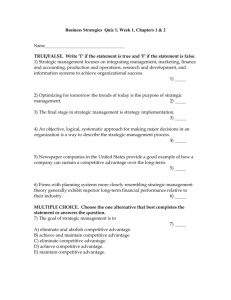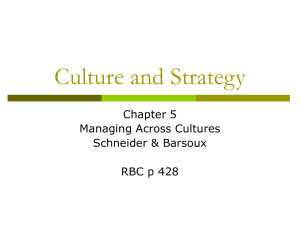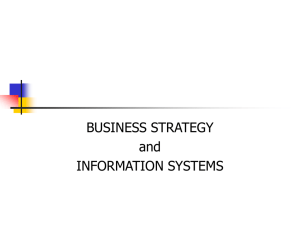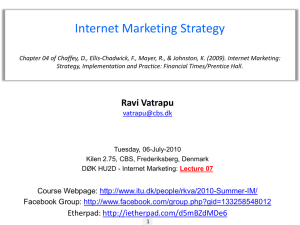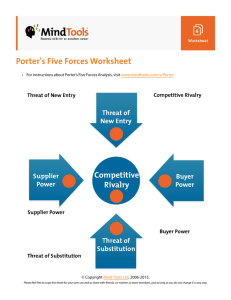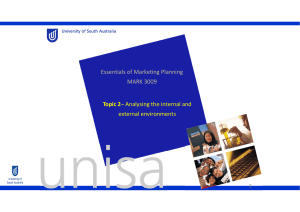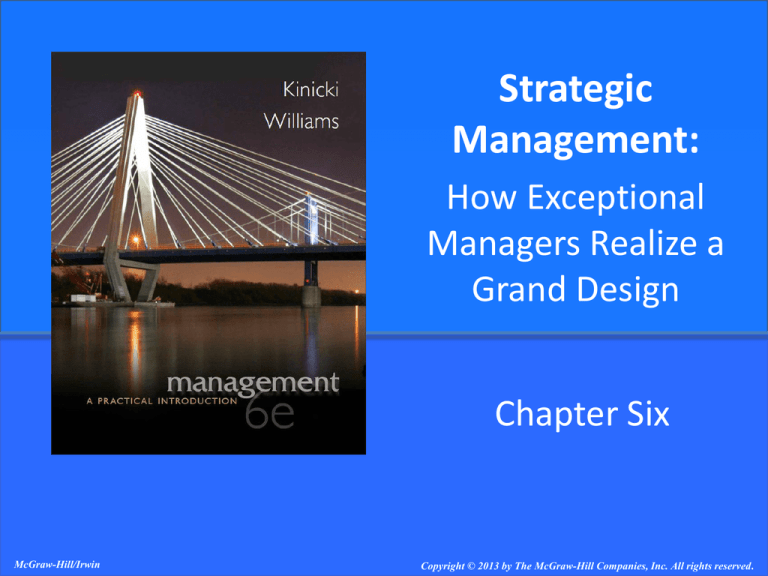
Strategic
Management:
How Exceptional
Managers Realize a
Grand Design
Chapter Six
McGraw-Hill/Irwin
Copyright © 2013 by The McGraw-Hill Companies, Inc. All rights reserved.
Major Questions You Should Be
Able to Answer
6.1 Am I really managing if I don’t have a
strategy?
6.2 What’s the five-step recipe for the strategicmanagement process?
6.3 How can competitive intelligence, SWOT,
and forecasting help me establish my
strategy?
6-2
Major Questions You Should Be
Able to Answer
6.4 How can four techniques—Porter’s
competitive forces, competitive strategies,
diversification and synergy, and the BCG
matrix—help me formulate strategy?
6.5 How does effective execution help managers
during the strategic-management process?
6-3
The Dynamics of Strategic Planning
Strategy
large-scale action plan that sets the direction for
an organization
Strategic management
process that involves managers from all parts of
the organization in the formulation and the
implementation of strategies and strategic goals
6-4
Why Strategic Management &
Strategic Planning Are Important
1. Provide direction and momentum.
2. Encourage new ideas.
3. Develop a sustainable competitive
advantage.
6-5
What Is an Effective Strategy?
Strategic positioning
attempts to achieve sustainable competitive
advantage by preserving what is distinctive about
a company
“performing different activities from rivals, or
performing similar activities in different ways”
6-6
The Strategic-Management Process
Figure 6.1
6-7
Common Grand Strategies
Growth strategy
involves expansion–as in sales revenues, market
share, number of employees, or number of
customers
Stability
involves little or no significant change
Defensive
involves reduction in the organization’s efforts
retrenchment
6-8
How Companies Can Implement
Grand Strategies
Table 6.2
6-9
The Strategic-Management Process
Strategy formulation
process of choosing among different strategies
and altering them to best fit the organization’s
needs
Strategy implementation
putting strategic plans into effect
6-10
SWOT Analysis
Figure 6.2
6-11
SWOT Analysis
Organizational
strengths
skills and capabilities
that give the
organization special
competencies and
competitive
advantages in
executing strategies
in pursuit of its
mission
Organizational
weaknesses
drawbacks that
hinder an
organization in
executing strategies
in pursuit of its
mission
6-12
Porter’s Four Competitive
Strategies
Cost-leadership strategy
keep the costs, and hence prices, of a product or
service below those of competitors and to target
a wide market
6-13
Porter’s Four Competitive
Strategies
Cost-focus strategy
keep the costs of a product below those of
competitors and to target a narrow market
Focused-differentiation
offer products that are of unique and superior
value compared to those of competitors and to
target a narrow market
6-14
The BCG Matrix
Figure 6.4
6-15

